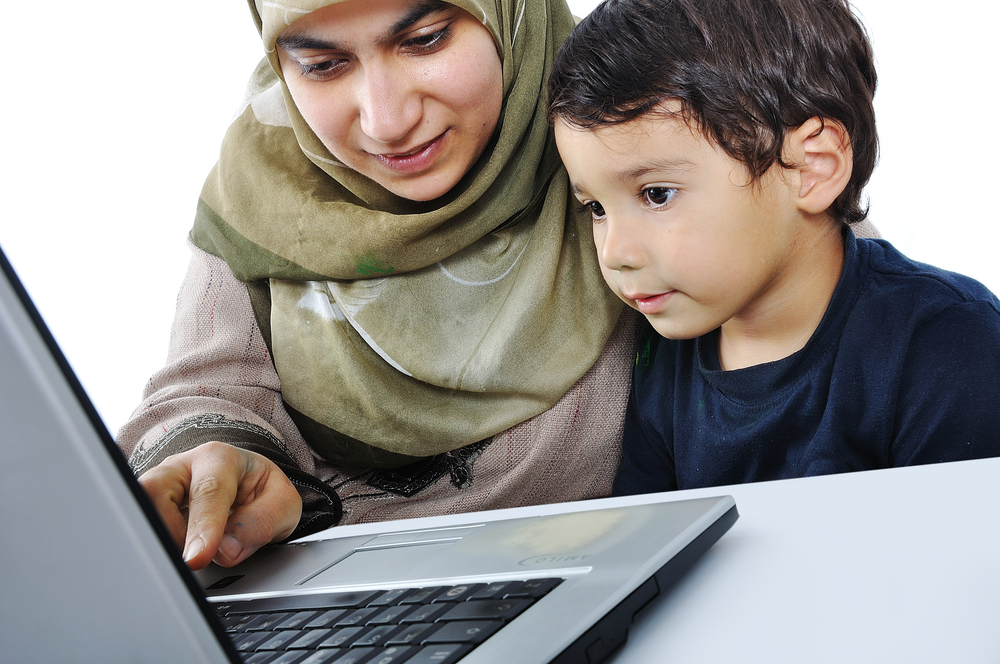8 Ways to Respect Our Children’s Personalities
 In today’s world, children are considered to be very important. Full attention is given by societies and governments to their upbringing and respecting their personality in the family and the society. In spite of this, people today do not pay as much attention to children’s instruction as the Leader of the Muslims did.
In today’s world, children are considered to be very important. Full attention is given by societies and governments to their upbringing and respecting their personality in the family and the society. In spite of this, people today do not pay as much attention to children’s instruction as the Leader of the Muslims did.
The Prophet had a special love of children, whether they were his own children or those of others. It has been written about him: “Kindness towards children was one of the special practices of the Prophet.”
This same practice was continued by the Imams and they respected children’s personalities as well. Some examples have been provided below.
- Asking Children’s Views
Imam ‘Ali asked his children intellectual questions in the presence of others and in some cases, he would let his children answer the questions of others.
Once Imam ‘Ali asked his children, Imam Hasan and Imam Husain some questions. The latter responded wisely and briefly. Then Imam ‘Ali turned to someone known as Harith A‘war, who was present in the gathering and said: “Teach these wise words to your children to improve their reasoning and thinking abilities.”
Thus Imam ‘Ali expressed his respect for his children in the best possible way and contributed to the creation of the greatest personality and independence in them.
- Sociability
One of the most basic factors in the development of a child’s personality is sociability and proper treatment. Prophet Muhammad clearly advised his followers concerning this. He told them: “Respect your children and treat them with good manners and in an acceptable way.”
Therefore, those who want to have children with a strong personality must guide them with good training and avoid treating them improperly as an improper practice cannot lead to the upbringing of worthy children who have a strong personality.
- Fulfillment of Promises
Fulfillment of promises towards children contributes to the development of their self-confidence and affects their personality. The true leaders of Islam have given much advice about the fulfillment of promises to children. Some examples are as follows:
Imam ‘Ali said: “It is not appropriate to tell lies, whether seriously or jokingly. It is not appropriate to make a promise to one’s children and fail to fulfill it.”
Imam ‘Ali also said: “The Prophet said, ‘If any of you makes a promise to his child, he must fulfill it.”
Numerous sayings have been recounted in Islamic sources from the Imams about the necessity of parents, fulfilling their promises.
- Familiarizing the Child with the Difficulties of Life
One of the ways to strengthen a child’s personality, especially in the case of boys, is to familiarize them with the difficulties of life so as to prepare them for the future; children must understand in practice that one has to work hard to obtain anything. If a child is not familiar with the problems and difficulties of life, when he does face difficulties, he will become easily frustrated. This has been discussed in the statements of religious leaders as well.
Imam Musa ibn Ja‘far has said, “It is better for a child to become familiarized with the unavoidable difficulties of life, which are the toll of life, during childhood so that he can be patient during youth and adulthood.
It must be remembered that familiarizing the child with the difficulties of life should not bother the child, i.e. the jobs given to him to do should not be beyond his capabilities. Therefore, the child’s abilities must be taken into consideration as well.
The Prophet reminded us of four points in this respect:
- What the child has been able to do should be accepted.
- The child should not be asked to perform difficult tasks beyond his abilities.
- The child should not be persuaded to commit sins or be rebellious.
- The child should not be told lies and silly things should not be done in front of him.
It has been narrated elsewhere that, “One day, when the Messenger of God was seven years old, he asked his nanny (Halimah Sa‘diyah): ‘Where are my brothers?’ (The Prophet lived in Halimah’s house and he called her sons as brothers.) She answered: “Dear child, they have gone to graze the sheep with which God has blessed us.’ The child responded: ‘O Mum, you did not treat me justly.’ ‘Why?’ she asked. ‘Is it right that I should stay in the shade of the tent and drink milk while my brothers are in the hot desert sun?’”
- Appreciating What the Child Does
The Prophet himself practiced all that he advised his followers concerning the upbringing of children and respecting their personality. One of the things he often did was to give a high value to actions performed by children.
‘Amr ibn Harith has been quoted as saying: “The Prophet passed by ‘Abdullah ibn Ja‘far ibn Abu Ṭalib, while the latter was a little child. The Prophet thus prayed for him, ‘O God, bless him in his dealings and commerce.’”
- Rising in the Presence of Children
In order to show respect to his own children, the Prophet would either lengthen his prostration during prayer or would end the prayer quickly (depending on the circumstances). In all occasions he respected children and he would teach the people in practical terms how to train the personalities of their children.
One day, Imam Hasan and Imam Husayn arrived while the Prophet was sitting. The Prophet rose to show respect to them and waited for them. As they were little children and weak, this took some time. The Prophet went towards them to welcome them. He opened his arms, took them both, put them on his shoulders and walked, while saying, “What a good ride you are having and what good riders you are!”
The Prophet would also stand in the presence of his daughter, Fatimah Zahra.
- Foresight for Children
One day Imam Mujtaba called his children and his nephews and said to them, “You are the children of the society. It is hoped that in the future you will be great members of the society and that you will strive to acquire knowledge. Any of you, who cannot memorize scholarly material, should write it down, keep the written material at home and refer to it whenever necessary.
As you see, Imam Mujtaba thought of the future of children and familiarized parents with this reality. It was reported that:
“A man from among the Helpers died. He had a small amount of capital which he had lost towards the end of his life in worship and in seeking God’s pleasure. On the same day he died, his children were forced to ask the people for help. This story was told to the Prophet. He asked, ‘What did you do with his body?’ They replied: ‘We buried it.’ ‘If I knew this earlier,’ said the Prophet, ‘I would not have allowed you bury him in the Muslim cemetery, because he lost his wealth and properties and left his children to beg among the people.’”
- Teaching Religious Edicts
If children practice praying and other acts of worship, these activities will have a bright effect on their internal characters. Although a child may not understand the meaning of the words and sentences in the prayer for example, he will no doubt begin to understand the need to focus attention on God and this will enable him to have a close relationship with God, experience peace of mind in times of hardship and obtain His infinite mercy and support. God says:
“Who have believed and whose hearts have rest in the remembrance of Allah. Verily in the remembrance of Allah do hearts find rest.”
In order to bring up pious, God-fearing children, there needs to be harmony between their bodies and their souls. To this end, Islam has obligated parents to draw the attention of their children to God and to teach them to worship Him and the knowledge of religious precepts. Islam has ordered parents to make their children pray.
Mu‘awiah ibn Wahab asked Imam Sadiq, “At what age should we make children pray?” “Between the ages of six to seven years, make them pray.” Imam said.
The Prophet is quoted as saying, “Make your children pray at the age of seven.”
In another narration about parental duties with respect to children’s faith, Imam Baqir is quoted as saying, “At the age of three, teach the child the words of monotheism, i.e. La ilaha ill-Allah. At the age of four, teach the child to say Muhammad rasul Allah (Muhammad is God’s Prophet). At the age of five, make him face the kiblah and order him to prostrate before God. At the age of six, make him bow before God and teach him the right method of prostration. At the age of seven, tell the child to wash his hands and face (ablution) and pray.”
Parents and instructors should be aware that religion is of the greatest help to them because faith is like a burning torch that lights up the way and awakens the conscience. It can easily show the right path wherever there is deviation.
Source: The Prophet’s Attitude towards Children and Youth written by Muhammad Ali Chenarani


